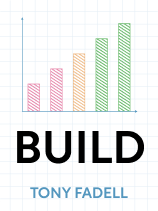

This article is an excerpt from the Shortform book guide to "Build" by Tony Fadell. Shortform has the world's best summaries and analyses of books you should be reading.
Like this article? Sign up for a free trial here.
How did world travel inspire the concept of a smart home? Why did Tony Fadell end his relationship with Nest?
In Build: An Unorthodox Guide to Making Things Worth Making, entrepreneur Tony Fadell tells the story of his career. He talks about starting Nest—a smart home device company—and later selling it to Google for billions of dollars.
Keep reading to learn about Tony Fadell, Nest, and the start of the smart home revolution.
Tony Fadell & Nest
Let’s take a look at the road that ultimately led Tony Fadell to Nest. In 1999, he quit Philips, where he had overseen the underwhelming release of the Philips Velo and Nino—essentially business-focused smartphones. He started to focus on his dream of building a handheld music device. That dream led Fadell to a job at Apple, where he built several generations of the iPod and the iPhone and rose through the ranks to Senior Vice President.
(Shortform note: In Steve Jobs, Walter Isaacson explains that Fadell’s journey to and at Apple was not without controversy. Notably, Fadell was pressured into signing onto Apple full-time when he initially only wanted to stay on as a consultant. Additionally, Fadell and engineer Jonathan Rubinstein [who brought Fadell on] often clashed, as both believed that they were the main creator of the iPod.)
In 2010, Fadell quit Apple to travel the world with his family—and was consistently frustrated by old, inefficient thermostats. So, that same year, Tony Fadell started Nest (along with co-founder Matt Rogers) and became CEO. The company successfully released a smart thermostat and a smoke and carbon monoxide alarm. This success was thanks in part to Fadell’s insistence that brick-and-mortar stores market Nest products in a dedicated “Connected Home” aisle.
(Shortform note: Fadell and Rogers successfully kicked off the smart home revolution—a dramatic rise in the development of internet-connected home appliances—and with it, a host of privacy and security concerns. Nest hasn’t been immune to these; after Fadell’s tenure, the company attracted controversy for hiding microphones in their security cameras.)
Google Acquires Nest
In 2014, Fadell sold Nest to Google, which wanted to expand into the smart home market. Fadell was thrilled at the opportunity to use Google’s massive resources to achieve Nest’s vision of creating a fully connected smart home. But, the two companies struggled to integrate their cultures. Then, in 2015, Google restructured itself into Alphabet and gave Fadell one week’s notice that Nest would effectively turn into a non-Google company with no access to the resources Fadell had expected. Shortly after, Google told Fadell they were selling Nest—at which point Fadell quit. Google never sold Nest. But Fadell never looked back: Today, he spends his time on Build Collective, a venture capital firm.
(Shortform note: Fadell’s departure from Alphabet was mired in controversy, as headlines speculated about the “tumult” that Fadell’s management style caused at Nest. And Google’s restructuring campaign didn’t change after Fadell’s departure. After several rebrands, customers in 2023 remain unclear as to what Nest products Google will continue to support in the coming years. But Fadell’s career remains active, as he focuses his efforts on the cryptoverse.)

———End of Preview———
Like what you just read? Read the rest of the world's best book summary and analysis of Tony Fadell's "Build" at Shortform.
Here's what you'll find in our full Build summary:
- Entrepreneur Tony Fadell's memoir, from the iPhone to Nest
- Advice for succeeding in every stage of your career, from beginners to CEOs
- Tips for building a product-based business and a great team






